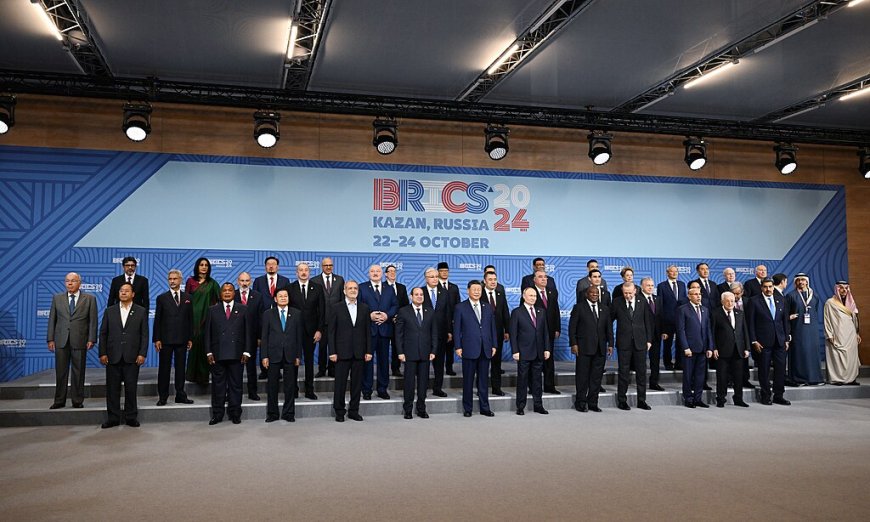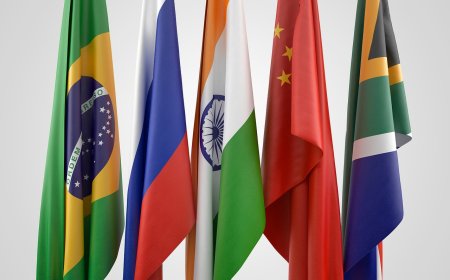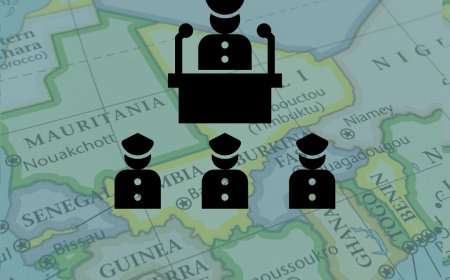This article is part of the BRICS thought leadership series, published by APRI in collaboration with the University of Johannesburg. It explores key themes from the 16th BRICS Summit and the group's broader initiatives. The series is edited by Ada Mare, Bhaso Ndzendze, Serwah Prempeh.
Summary
- AI is crucial for economic growth and cooperation among BRICS nations, enhancing productivity and fostering collaboration.
- Through shared development efforts, AI can help BRICS countries address global challenges like climate change and cybersecurity.
- Regulatory frameworks and international cooperation are essential for ethical AI development, with BRICS countries leading efforts to establish global AI standards.
Introduction
The BRICS nations – Brazil, Russia, India, China and South Africa – represent five of the world’s fastest-growing economies, each having significant influence on the global economy and geopolitics. As these nations continue to develop, the role of technology, particularly artificial intelligence (AI), has become increasingly critical in driving economic growth, enhancing societal welfare and fostering international cooperation.
AI encompasses a variety of technologies and applications designed to simulate human intelligence. Its potential benefits span automation, data analysis and decision-making, making it a powerful tool for enhancing productivity, efficiency, innovation and human well-being (Makridakis, 2017; Saba & Pretorius, 2024). AI is also fundamentally transforming human interactions and business practices, heralding what could be a fourth industrial revolution (Lu, 2021). This technology therefore has the potential to not only transform industries within the BRICS countries but also to strengthen their collaborative bonds. For example, by sharing AI research and development efforts, these countries will be able to pool resources, reduce costs and accelerate technological advancements. Through such a collaborative approach, BRICS countries can pioneer the development of standardised frameworks and protocols that facilitate the integration and interoperability of AI systems across borders.
With the co-development and implementation of AI technologies, the BRICS nations can enhance their collective bargaining power globally. This unity will help them negotiate better terms in international trade agreements, protect their interests in global forums and address common challenges such as climate change and cybersecurity threats. Additionally, these countries can gain insights into regional and international trends using AI-powered data analysis and predictive modeling, enabling them to make informed decisions and coordinate their actions effectively. In sum, the development and sharing of AI technologies and technological resources can bridge the digital divide and ensure that all member countries benefit from the advancements in AI.
However, strengthening their position as lead actors on a geopolitical stage requires the BRICS countries to implement smart policies and create suitable conditions for developing AI technologies (Cyman et al., 2021). While the ongoing cooperation on the development of joint facial recognition systems, cross-border data sharing, regulatory frameworks, research and startup ecosystems paints a promising picture, AI's regulatory and ethical landscape needs greater attention if BRICS countries aspire to lead on responsible AI. Political, economic and institutional governance also play a critical role in determining the impact of AI on the economic growth of BRICS countries. They therefore need to balance the application of AI in different sectors against its negative impact on employment and the partial replacement of workers and unethical use cases that may hinder development among the member countries. For example, while the application of AI for maritime security and cross-border intelligence serves peaceful purposes, its possible implementation in the conflicts in the Middle East and Eastern Europe may lead to abuse of the technology.
This warrants an analysis of the potential for AI to foster domestic development and international cooperation among the BRICS nations. However, the literature pertaining to the recent developments among BRICS countries is disparate. This paper attempts to consolidate these sources in order to explore the following research objectives:
- The role of AI in fostering cooperation for collective economic growth in BRICS nations
- The influence of AI on maritime and internet security
- Emerging cooperation on AI regulation and governance
Comprehensive analysis of these aspects of AI development in BRICS is important for establishing a model of cross-border cooperation for other Global South countries.
Analysis
AI fostering economic growth and maritime security
The influence of BRICS countries on the global economy is profound. Formed during the 2008 Global Financial Crisis, BRICS was established as a reformist group aiming to challenge Western dominance in multilateral financial institutions. Since 2014, BRICS has taken on a more geopolitical character, pushing for a fairer international system that better serves the Global South (Darnal et al., 2023). The expansion of BRICS provides access to new markets and trade opportunities, boosting economic growth and stability among its members. Diversifying economic interests is essential for reducing risks and building a resilient financial ecosystem (Bhowmick, 2024).
However, despite the shared goal of enhancing the Global South’s role in global trade, BRICS nations face numerous internal challenges. Intra-BRICS trade is complicated by opaque licensing restrictions, export taxes and logistical inefficiencies, such as cumbersome documentation, customs clearance delays and poor infrastructure (Baschuk, 2023). AI technologies offer a solution to these barriers by streamlining and automating trade processes, from customs clearance to trade compliance. By employing machine learning and natural language processing, AI can expedite document processing, detect anomalies and improve the efficiency of international trade, enhancing security and compliance (International Trade Council, 2023).
Economic imbalances within BRICS, particularly China's dominant position, also present challenges. For example, China’s dominance has led to the deindustrialisation of countries like Brazil, which has lost its status as the leading exporter of manufactured goods to South American nations (Baschuk, 2023). This underscores the importance of identifying new markets for trade. AI-driven market intelligence can help businesses analyse vast amounts of data to identify trends, consumer preferences and market demands. This enables companies to adapt their products and strategies to meet the specific needs of different markets, boosting their global competitiveness (International Trade Council, 2023).
At the same time, multinational companies from BRICS countries operating in regions like Africa and Latin America sometimes perpetuate exploitative practices in a manner similar to traditional West-Global South relations. This is particularly true in raw material extraction and labour use (Baschuk, 2023). AI can mitigate these practices by enhancing transparency and accountability through improved risk assessment and fraud detection. By analysing transaction data and shipping information, AI can detect suspicious patterns, enabling businesses and customs authorities to take proactive steps against illicit trade and protect intellectual property (International Trade Council, 2023).
Beyond trade, AI has the potential to revolutionise industries and economies. While AI is often seen as a catalyst for growth and employment, concerns remain about its potential to displace workers in the short term (Lu, 2021). However, economic theory suggests that while technological advancements may initially replace jobs, they will ultimately create new opportunities as industries evolve (Saba and Ngepah, 2024). This makes AI an essential technology for BRICS nations, where concerns about job displacement due to technological change are widespread.
AI can also play a critical role in enhancing maritime security for BRICS members, who control significant maritime regions, such as the Arctic Sea (Russia), the Western Pacific (China and Russia), and the Indian Ocean (India). Maritime security is vital for protecting resources and ensuring safe trade routes, yet it faces numerous threats, including piracy, terrorism and illegal activities. AI technologies can significantly enhance maritime surveillance by detecting suspicious activities and improving decision-making in naval operations. For example, AI can detect skiffs used by pirates, which are difficult to track using conventional radar systems (Pheng, 2020). In naval operations, AI improves command and control systems, making naval vessels smarter and more responsive to potential threats (Mukherjee, 2018). Cybersecurity is another area where AI can bolster BRICS cooperation. The 2013 eThekwini Declaration and the 2015 Ufa Declaration highlighted the need for secure cyberspace among BRICS nations. While national cybersecurity policies differ across the bloc, AI can enhance cybersecurity efforts by detecting and responding to threats more efficiently. By fostering cooperation in this area, BRICS can strengthen its collective security in the digital age (Belli, 2019).
Regulatory cooperation on AI
The establishment of an adequate legal framework for regulating AI-based technologies in the digital era is crucial for the BRICS counties’ continued development. A significant legal instrument in this regard is the Memorandum of Understanding (MoU) on Cooperation in Science, Technology and Innovation among the BRICS members. Approved in 2015, the memorandum outlines the primary areas of cooperation, including the exchange of information on policies and programmes, promotion of innovation and technology transfer, high-performance computing, basic research, space research and exploration, aeronautics, astronomy and earth observation (Cyman et al., 2021). Additional focus areas include medicine and biotechnology, high-tech zones, science parks and incubators, technology transfer, information and communication technology, and geospatial technologies.
To fully realise the potential of the MoU, it is essential to implement short-term exchanges of scientists and experts, establish training programmes for human capital development and organise collaborative workshops and conferences. Additionally, the exchange of scientific information, creation of joint funding mechanisms and formulation of collaborative research programmes are necessary to foster innovation (Ibid). Greater access to infrastructure, simultaneous calls for research proposals and cooperation among national academies and agencies will further strengthen this partnership in science, technology and innovation.
Another pivotal legal document is the Strategy for BRICS Economic Partnership, approved in 2015, which aims to consolidate efforts to foster innovative economic development based on advanced technologies and skills development (Ibid). This strategy seeks to build knowledge economies, promote a peaceful, secure, open, trusted and cooperative digital and internet space, and consider incentives to attract investment and production in BRICS countries by global IT manufacturers. It also aims to address human resource and technology gaps through international scientific and technological cooperation. To achieve these goals, BRICS should form a working group on ICT cooperation, promote regular ministerial interactions and offer training programmes for human capital development in IT and digital innovations. Additionally, the BRICS members should exchange expertise on information society policies to ensure equitable distribution of the benefits of these new technologies.
Though the MoU and the Strategy document are adequate in emphasising the importance of multinational cooperation, they do not specifically list the joint initiatives that can lead the way for AI collaboration. The state of AI regulation in each of the BRICS nations varies, depending on the cultural, social and economic nuances of each member nation. To leverage AI and the digital economy for accelerated development in the Global South, BRICS nations must enhance cooperation and promote joint activities to address AI-related concerns. This will enable member countries to drive robust economic growth and uphold the multilateral trading system, guided by the rules and principles of the World Trade Organization.
It is important to note that BRICS nations are currently collaborating on information and communications technologies (ICT). At the 10th BRICS Working Group meeting on Information and Communication Technologies Security in Moscow, they agreed to establish a contact point register for sharing information on cyberattacks. Meanwhile, Russia's proposals to enhance the regulatory framework for international information security and initiate dialogue with the scientific community received positive feedback from its partners (BRICS Russia, 2024). Additionally, the working group on ICT cooperation has grown in importance for countering the use of ICT for criminal and terrorist purposes, promoting innovative telecommunications equipment, developing new communication standards and technologies, and resisting cyber threats (Mahrenbach and Papa, 2024).
The BRICS group must collectively develop AI policies and advance members’ AI capabilities. Initiatives such as the BRICS AI Study Group and the Digital Economy Working Group, as committed to at the 2023 BRICS Summit, are steps in this direction (Ibid). Additionally, the BRICS-led New Development Bank (NDB) is investing in AI applications within BRICS countries. As these developments progress, effective regulation is becoming more crucial. Approaches by the original BRICS nations towards AI regulation have been diverse. While India has a dedicated National Strategy for AI which lays down principles for inclusive, progressive AI that aids the economy, China's New Generation Artificial Intelligence Development Plan emphasises responsible development, data privacy and cybersecurity, while aligning with the state's control and surveillance priorities. Russia's National AI Development Strategy prioritises infrastructure advancements, including supercomputing, cross-country collaboration and increased support for R&D, along with AI awareness and training initiatives. Brazil’s Proposed AI Regulation focuses on safeguarding fundamental rights and promoting secure, reliable systems to enhance national autonomy and reduce dependence on foreign AI tools. South Africa’s National AI Policy Framework seeks to integrate AI technologies for economic growth and societal well-being, positioning the country as a leader in AI innovation, while prohibiting practices like manipulation, exploitation of vulnerable groups, biometric categorisation of sensitive traits and social scoring.
However, aligning the diverse approaches to AI regulation within the BRICS countries presents a challenge. The BRICS group must navigate competition with governments and tech corporations that often dominate multistakeholder initiatives, potentially sidelining issues relevant to BRICS and developing economies. Coordinating regional discussions in South Asia and Africa could help establish shared positions or guiding principles on AI, emphasising its impact on labour and financial markets and cooperative measures for AI capacity-building.
Diversifying AI for the Global South
Since the signing of the MoU on Science, Technology and Innovation in 2015, AI has been a recurring topic in BRICS ministerial meetings across sectors such as agriculture, communications, education, environment, foreign affairs, science and technology, and trade. Declarations from leaders' summits and ministerial meetings indicate that BRICS countries view AI as a catalyst for economic growth, technological progress and inclusive societies (Ibid).
The BRICS nations have therefore called for an effective global framework on AI, with a focus on ethical development. They support communication and cooperation on AI technology to promote mutual benefits and advocate for strengthening the international governance of AI. This includes encouraging policy exchanges and dialogues with the aim of establishing a global governance framework to protect human rights while spurring innovation and economic growth (ABP News Bureau, 2023). In August 2023, Chinese President Xi Jinping announced plans to form an 'AI study group' within the BRICS member countries with the purpose of monitoring AI technology development. This group aims to catalyse innovation in AI and develop a robust governance framework to enhance the security, reliability, control and equity of AI technologies (Digital Watch, 2023).
These initiatives are crucial. Not only may infrastructure challenges in the Global South hinder AI development due to the significant data requirements and computing resources needed to train AI systems (Okolo, 2023), the Global South often serves as a hub for outsourced data-labelling labour, raising concerns about data protection and AI misuse. The nascent state of AI legislation globally therefore presents an opportunity for the Global South to address the potential negative impacts of AI. Governments must draft and enact AI strategies to protect vulnerable communities and enable responsible innovation. Furthermore, these nations must be prominently represented in multilateral global conversations on AI governance (Digital Watch, 2023).
The BRICS countries are also collaborating on joint facial recognition systems and cross-border data-sharing networks, while simplifying regulatory frameworks, investing in education and research, and supporting AI start-ups. For instance, China is considering launching a BRICS centre for cooperation in technology development, as announced by Vice Foreign Minister Ma Zhaoxu at a BRICS meeting during the Russian Chairmanship (Lavrov, 2024). Such developments counter the hegemony of the Global North in AI development and policymaking, and position BRICS members as vocal players representing the unique needs and challenges of the Global South.
On August 22, 2024, the National Center for Artificial Intelligence Development, under the Government of the Russian Federation, announced a significant enhancement in collaborative efforts between Russia and China in the domain of AI. This initiative is particularly noteworthy as it underscores the commitment of both nations to fostering a structured partnership aimed at advancing AI technologies. The National Center for AI outlined several key objectives for this collaboration, including the establishment of a working group dedicated to AI cooperation, facilitating the exchange of experiences and best practices concerning the regulation of ethics and the industrial application of AI, and promoting cooperative endeavors among BRICS nations to enhance their collective capabilities in AI development. This strategic partnership not only emphasises the importance of ethical standards in AI but also highlights the potential for increased synergies within the BRICS framework, aiming to leverage AI for economic and technological advancements across member states (Data Guidance, 2024).
Recommendations
Given their diverse economic landscapes, technological capabilities and developmental priorities, BRICS nations require a coordinated approach to leverage artificial intelligence (AI) for inclusive growth. Effective collaboration in AI can be achieved through several key strategies, which collectively bridge technological gaps and foster innovation across the member states. Here are a few recommendations for how BRICS countries can thrive in the evolving AI landscape.
Joint research initiatives
Joint research and development (R&D) initiatives should be established, focusing on socially relevant applications of AI in areas such as healthcare, climate change mitigation, agriculture and infrastructure management. By creating AI research hubs and innovation centres across BRICS countries, expertise can be pooled, enabling the development of solutions tailored to the unique challenges faced by these regions. Each nation's distinctive strengths – for example, China’s advancements in AI hardware, India’s proficiency in software development, and Russia’s capabilities in cybersecurity – can be synergised to drive innovation.
Ethical thought leadership
Developing common ethical and regulatory frameworks is critical to the responsible implementation of AI technologies. BRICS nations should collaboratively create guidelines that address key concerns such as data privacy, algorithmic transparency and the mitigation of biases in AI systems. By harmonising their regulatory approaches, these countries can ensure the ethical deployment of AI technologies and position themselves as leaders in shaping global AI governance.
Data exchange and sovereignty
Data sharing and infrastructure development is another critical pillar for collaboration. The establishment of shared AI infrastructure, including secure data-sharing platforms and cloud-based computing resources, can accelerate innovation and reduce duplication of effort. A BRICS-wide commitment to creating accessible AI infrastructure would enable all member nations to benefit from each other's advancements.
Talent development
Capacity building and talent exchange programmes should be prioritised. Investments in education, skilling and AI literacy across BRICS nations will foster the development of a highly trained workforce, ensuring that these countries can maintain a competitive edge in AI innovation while promoting equitable access to AI opportunities.
Conclusion
AI is destined to play a pivotal role in fostering cooperation among the BRICS members and in capacity development in the economic, regulatory and security landscapes. This paper underscores the potential of artificial intelligence (AI) to foster cooperation among BRICS nations. The analysis of the current regulatory, economic and security landscapes demonstrates that AI can serve as a catalyst for collaboration, addressing various challenges faced by these countries. Existing agreements and memoranda, such as the BRICS MoU on Cooperation in Science, Technology and Innovation, and the Strategy for BRICS Economic Partnership, provide a robust framework for future AI collaborations. These documents promote the exchange of information and innovation and lay the groundwork for the establishment of common standards and practices.
The cooperative development of AI technologies from a Global South perspective can enhance inclusivity and ensure that AI benefits all member nations. By working together on formulating regulations, ethical standards and practical use cases, BRICS countries can set a global precedent for AI governance. This unified approach can position AI as a driver of geopolitical collaboration, bridging the diverse economic, social and political profiles within the BRICS bloc. Ultimately, fostering AI cooperation among BRICS nations will not only strengthen their collective voice in the global arena but also promote sustainable and inclusive technological advancement, reinforcing the importance of solidarity and shared progress in the digital age.
References
ABP News Bureau. (2023, June 2). BRICS nations call for an effective global framework on AI, and emphasise ethical development. ABP Live. https://news.abplive.com/technology/ai-brics-nations-call-for-effective-global-framework-on-artificial-intelligence-emphasise-on-ethical-development-1606406
Aghion, P., Jones, B. F., & Jones, C. I. (2017). Artificial intelligence and economic growth (Working paper 23928). National Bureau of Economic Research. https://doi.org/10.3386/w23928
Baschuk, B. (2023, August 23). How global trade changes with BRICS on the rise. Bloomberg. https://www.bloomberg.com/news/newsletters/2023-08-23/supply-chain-latest-how-global-trade-changes-with-saudi-indonesia-in-brics
Belli, L. (2019, November 13). From BRICS to CyberBRICS: New cybersecurity cooperation. China Today. http://www.chinatoday.com.cn/ctenglish/2018/tpxw/201911/t20191113_800184922.html
Belli, L. (2021). Cybersecurity Policymaking in the BRICS Countries: From Addressing National Priorities to Seeking International Cooperation. The African Journal of Information and Communication, 28, 1-14. https://doi.org/10.23962/10539/32208
Bhowmick, S. (2024, February 28). BRICS Plus: Navigating global challenges and broadening influence. Observer Research Foundation. https://www.orfonline.org/research/brics-plus-navigating-global-challenges-and-broadening-influence
BRICS Russia. (2024). Meeting of the BRICS Working Group on ICT security issues. https://brics-russia2024.ru/en/events/vstrechi-rabochikh-grupp-mekhanizmov/10-e-zasedanie-rabochey-gruppy-briks-po-voprosam-bezopasnosti-v-sfere-ispolzovaniya-ikt/
Chen, S. (2018, February 4). China’s plan to use artificial intelligence to boost the thinking skills of nuclear submarine commanders. South China Morning Post. http://www.scmp.com/news/china/society/article/2131127/chinas-plan-use-artificial-intelligence-boost-thinking-skills
Cyman, D., Gromova, E., & Juchnevicius, E. (2021). Regulation of artificial intelligence in BRICS and the European Union. BRICS Law Journal, 8(1). https://doi.org/10.21684/2412-2343-2021-8-1-86-115
Darnal, A., Beri, R., Garcia, A. S., Naidu, S., Sahay, T., & Mohiuddin, M. (2023, November 9). The Future of BRICS: Between Objectives and Challenges. Stimson. https://www.stimson.org/2023/the-future-of-brics-between-objectives-and-challenges/
Das, P. (2016, August 13). To Become a Deadly Sub-Hunting Force, the Indian Navy Needs to Think Bigger Than Just P-8Is. The Diplomat. https://thediplomat.com/2016/08/to-become-a-deadly-sub-hunting-force-the-indian-navy-needs-to-think-bigger-than-just-p-8is/
de Vivero, J. L. S., & Mateos, J. C. R. (2010). Ocean governance in a competitive world: The BRIC countries as emerging maritime powers – building new geopolitical scenarios. Marine Policy, 34(5), 967–978. https://doi.org/10.1016/j.marpol.2010.02.002
Digital Watch. (2023). BRICS announces formation of AI study group. https://dig.watch/updates/brics-members-announce-formation-of-ai-study-group
Export-Import Bank of India. (2016). Intra-BRICS trade: an Indian perspective. https://www.eximbankindia.in/Assets/Dynamic/PDF/Publication-Resources/ResearchPapers/80file.pdf
Data Guidance. (2024, August 26). International: Russia and China reinforce cooperation for AI development. https://www.dataguidance.com/news/international-russia-and-china-reinforce-cooperation-ai
International Trade Council. (2023). Exploring the Role of Artificial Intelligence in International Trade. https://tradecouncil.org/exploring-the-role-of-artificial-intelligence-in-international-trade/
Lavrov, S. (2024, May 3). BRICS Technology and AI Boom: Shaping the Future of Emerging Economies. TV BRICS. https://tvbrics.com/en/news/brics-technology-and-ai-boom-shaping-the-future-of-emerging-economies/
Lin, S., Wang, M., Jing, C., Zhang, S., Chen, J., & Liu, R. (2024). The influence of AI on the economic growth of different regions in China. Scientific Reports, 14, 9169. https://doi.org/10.1038/s41598-024-59968-7
Lu, C. H. (2021). The impact of artificial intelligence on economic growth and welfare. Journal of Macroeconomics, 69. https://doi.org/10.1016/j.jmacro.2021.103342
Mahrenbach, L., & Papa, M. (2024, March 27). BRICS Wants to Shape Global AI Governance, too. World Politics Review. https://www.worldpoliticsreview.com/brics-group-artificial-intelligence-governance/
Makridakis, S. (2017). The forthcoming Artificial Intelligence (AI) revolution: Its impact on society and firms. Futures, 90, 46-60. https://doi.org/10.1016/j.futures.2017.03.006
Mukherjee, T. (2018). Securing the maritime commons: The role of artificial intelligence in naval operations. Observer Research Foundation. https://www.orfonline.org/research/securing-the-maritime-commons-the-role-of-artificial-intelligence-in-naval-operations
Okolo, C. (2023, November 3). AI in the Global South: Opportunities and challenges towards more inclusive governance. Brookings. https://www.brookings.edu/articles/ai-in-the-global-south-opportunities-and-challenges-towards-more-inclusive-governance/
Pheng, G. W. (2020, October 21). Steering with artificial intelligence to combat maritime piracy. Safety4Sea. https://safety4sea.com/steering-with-artificial-intelligence-to-combat-maritime-piracy/
Roberts, H., Cowls, J., Morley, J., Taddeo, M., Wang, V., & Floridi, L. (2019). The Chinese approach to artificial intelligence: an analysis of policy, ethics, and regulation. AI & Society, 36, 59–77. https://doi.org/10.1007/s00146-020-00992-2
Saba, C. S., & Ngepah, N. (2024). The impact of artificial intelligence (AI) on employment and economic growth in BRICS: Does the moderating role of governance Matter? Research in Globalization, 8. https://doi.org/10.1016/j.resglo.2024.100213
Saba, C. S., & Pretorius, M. (2024). The impact of artificial intelligence (AI) investment on human well-being in G-7 countries: Does the moderating role of governance matter? Sustainable Futures, 7. https://doi.org/10.1016/j.sftr.2024.100156
Sarawgi, S., Mukherjee, D. N., Mathur, R., Ghatak, D., Chawla, N., Sinha, A., Chakrabarti, A. S., & Banerjee, A. (2023). AI in India - A Strategic Necessity. Indian Institute of Management Ahmedabad. https://www.iima.ac.in/sites/default/files/2023-07/Revised%20India%20AI%20Report_Jul%2010_Digital_compressed.pdf
Speller, I. (2014). Understanding Naval Warfare. Oxon: Routledge
Taipei Computer Association. (2023). Development of AI in India. https://icc-tca.org.tw/wp-content/uploads/2023/09/Artificial-Intelligence_TCA-Report.pdf
About the author
Arijit Goswami
Arijit Goswami is a Senior Growth Program Manager at MarketsandMarkets, advising global automotive enterprises on AI-driven strategies. With 8 years of experience in corporate strategy and consulting, he has worked with top firms across Southeast Asia, the Middle East, India, and Europe.




